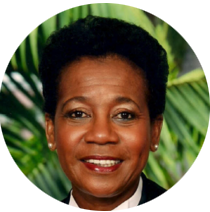Rubie Nottage FCIArb
Justice Rubie Nottage FCIArb is a Retired Justice of the Supreme Court of The Commonwealth of The Bahamas (Family Division), and is currently an Associate Professor, Law Department, University of The Bahamas, where she has lectured in ADR, Mediation and Arbitration in the UWI-LLB Law Programme. She is a founding member of and a former Director of Education and Training for the CIArb Bahamas Branch. She holds the status of CIArb Approved Faculty in both Arbitration and Mediation and is a post-training Mediation Assessor.

With an extensive Arbitration practice, her credentialed training includes Family and Divorce Mediation (Trinidad & Tobago), FIDIC contracts (ECV), Wealth Management, International Trade and Investment Dispute Settlement (PGDip Queen Mary College, London), and the recent CIArb Virtual Diploma in International Commercial Arbitration (2021). Rubie has a B.A and a M.A In Theology from Oxford University. She has a MBA from the Templeton Institute and is a named Templeton Scholar. She received her LL.B from King's College London and her LL.M (Distinction) from University College London. Rubie also has a B.A in Political Science and Economics from Queen's University, Ontario.

1. Why have you decided to specialise in ADR?
I was attracted to ADR because of the consensual approach it makes to conflict resolution and litigation. This aspect of respect for the concerns and motivations of all parties and not just the most powerful, was an attractive proposition for me. It allows for settlement of a dispute on a ‘win-win’ basis, rather than a ‘winner take all’ basis. In deciding to specialise in ADR, I saw it, and continue to view it, as the best arena for me to showcase my talent for judicial decision-making, whereby I might continue to engage in deeper empathetic listening, speaking and giving of advice towards the needed resolution of conflicts in business or personal relationships, in short, an arena in which I could make a difference!

2. What are the challenges women in ADR face in the early stages of their career?
One of the real challenges that women in ADR face in the early stages of their career is how to market themselves, how to get into the arena in which one’s talent is recognised and one which offers varied opportunities for appointment as an appropriate Mediator/Arbitrator. Institutional membership, such as the ICC can assist, but even then, the opportunity to become a visible face, or a known talent, can be distant and daunting, particularly if one is not multi-lingual.

3. What keeps you motivated in your career?
I think that the principal motivation is the opportunity to be of real service in bringing resolution to conflict in the lives or business relationships of others. I also enjoy the ‘cut and thrust’ of legal and procedural challenges raised in international arbitration and the often demanding hours of navigating through a particular scenario of events that calls for an innovative and thoughtful resolution within an international commercial arbitration legal framework. The mental stimulation is exciting in so many ways!

4. What is it like to work in a predominantly male profession?
Working in a predominantly male profession allows one to appreciate the distinctiveness of one’s own contribution to the total picture. It can often be somewhat daunting to ‘speak up’ where ‘male power’ dominates. There is a certain fear of being shouted down, or ‘spoken down to’, fear of your own value being belittled. Such environments demand persistence and a strong belief in oneself and in the value of your own contribution as being distinctive and value enhancing to the collective whole.

5. How has CIArb influenced your career?
CIArb’s existence as an institution that creates and fosters a learning environment has been instrumental in the growth of my career in ADR as an arbitrator/mediator. Through the many pathways that have been created for learning different aspects of ADR, I have been able to make invaluable additions to my ‘knowledge’ bank. The opportunities to interact and network with other like-oriented persons at various conferences both in person and through online events has also created opportunities for growth and advancement in my career progression and has been of great benefit in allowing me to meet colleagues who have a similar interest and mindset and are on a similar career path trajectory.

6. If you could practice ADR in any other country, which would you choose and why?
My quick and first response would be the practice of ADR at the Permanent Court of Arbitration at the Peace Palace in The Hague, Netherlands! That would be absolutely awesome!
However, bearing in mind the virtual environment that I believe ADR will begin to occupy more and more, I believe that as a Bahamian and a resident and native of the Caribbean region, to practice ADR right here in one of the region’s many island states is also optimum.
I don’t know that there is any other country or region that offers the equivalent technological infrastructure and climactic environment as well as the many varied opportunities for involvement in all aspects of international commercial arbitration, maritime law, offshore financial law, tourism, sports and environmental law arbitration.

7. Tell us about your interests.
Out of work, I enjoy walking, boating and swimming. I am actively involved in gender equality issues and events, and participate at multiple levels in supporting activism and giving voice to needed reform in this arena. I frequent local arts and crafts exhibits and, when time allows, I enjoy reading at least one good book a month.